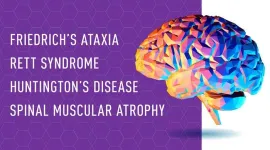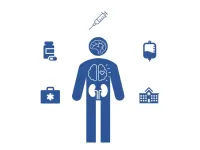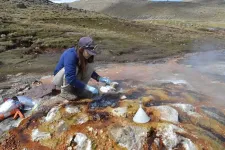Research to develop new rare disease therapies underway at The Jackson Laboratory
NIH grant will support new gene editing-based therapeutic approaches for four neurological conditions
2023-06-06
(Press-News.org)
Researchers led by Cathleen Lutz, Ph.D., are using an exciting new method, preclinical genomic editing, to develop safe, effective therapies for rare diseases and bring them to the clinic.
Unfortunately, the translation of the accumulated knowledge to safe and effective therapies has lagged. There are many reasons to predict that the situation is changing for the better, however, as powerful new gene-based therapies succeed in clinical trials and receive FDA approval.
Therapeutic strategies such as gene replacement and gene modulation (e.g., blocking protein production with anti-sense oligonucleotides) are at the forefront of the recent progress. But while they carry exciting promise for many applications and diseases, they are not without risk. In some cases they can provoke adverse immune responses, initiate cancer, and cause other serious side effects.
Researchers are therefore still hard at work to develop safer therapies for rare genetic diseases that provide lasting benefit. Now Cathleen Lutz, Ph.D., of The Jackson Laboratory (JAX) is spearheading a major effort to implement a new genomic research tool—preclinical genomic editing—to cure rare neurological genetic diseases.
Beyond CRISPR
CRISPR has revolutionized gene editing, but as originally applied it involves double strand DNA breaks that leave absolutely no room for error in the clinic. Researchers have continued to enhance CRISPR methods, however, and they have now advanced them to the point where they are able to make precise genomic alterations without cutting the DNA. Lutz, vice president of the Rare Disease Translational Center at JAX, will lead a multi-institutional team to develop and validate new gene editing-based therapeutic approaches for four neurological conditions: spinal muscular atrophy, Friedrich’s ataxia, Huntington’s disease, and Rett syndrome. Supported by a five-year, $22.8M grant from the National Institute of Neurological Disorders and Stroke (NINDS), Lutz and collaborators at JAX, The Broad Institute, Massachusetts General Hospital, Boston Children’s Hospital and UT Southwestern Medical Center will ultimately seek to advance at least one lead candidate therapy through a successful investigational new drug (IND) application.
At JAX, Lutz will work closely with Associate Professor Steven Murray, Ph.D., who leads the preclinical mouse model core to develop, validate and optimize in vivo mouse models for each disease. Other collaborators have extensive experience and resources for producing virus-based gene-editing therapy delivery to tissues, possess deep expertise in preclinical evaluation of gene-editing therapeutics, and have successfully navigated the regulatory path to IND submission. Collectively they seek to close the gap between preclinical research that has produced promising rare disease therapy strategies and the actual clinical delivery of safe and effective treatments to patients. Successful completion of the project milestones has the potential to revolutionize treatment for at least one of the diseases and provide a way forward for the other three, as well as a wide range of other rare genetic diseases.
From biology to the clinic
The preclinical genome editing project is being launched at a time when FDA approval of therapies for a few rare diseases are in the headlines, but the path to such approvals remains frustratingly difficult most of the time.
“There are many obstacles to developing safe, effective treatments for rare diseases,” says Lutz, “including small patient populations, high costs and regulatory barriers. Our goal is to remove or move past the obstacles, bring a highly promising new therapy strategy to the clinic, and directly benefit individuals with these diseases.”
NINDS focuses on neurological diseases, of course, but the research supported by the Somatic Cell Gene Editing Program (SCGE) may have much larger implications across the rare disease community and the estimated 7,000-10,000 rare genetic diseases that affect patients worldwide.
"Genetic mutations can cause some of the most rare and devastating disorders of the nervous system and throughout the body," says Walter Koroshetz, M.D., director of NINDS and co-chair of SCGE.
“Thanks to large-scale efforts like the Somatic Cell Genome Editing Program, we are starting to bring tools into the clinic to edit out these gene mutations. While there are still challenges to overcome, the level of hope for effective treatments is high.”
END
[Attachments] See images for this press release:

ELSE PRESS RELEASES FROM THIS DATE:
2023-06-06
Sage and the Center for Advanced Study in the Behavioral Sciences (CASBS) at Stanford University are pleased to announce Elizabeth Anderson and Alondra Nelson as winners of the 2023 Sage-CASBS Award.
Established in 2013, the Sage-CASBS Award recognizes outstanding achievement in the behavioral and social sciences that advances our understanding of pressing social issues. It underscores the role of the social and behavioral sciences in enriching and enhancing public discourse and good governance. Past winners of the award include Daniel Kahneman, psychologist and Nobel laureate in economic sciences; Pedro ...
2023-06-06
Children and teenagers who volunteer tend to flourish mentally and physically, according to a new study from UTHealth Houston.
The study, led by Kevin Lanza, PhD, assistant professor of epidemiology, human genetics, and environmental sciences at UTHealth Houston School of Public Health, was published recently in JAMA Network Open.
Overall, the research team found that youths who had volunteered in the past year were in better physical health, had a more positive outlook on life, and were less likely to have anxiety, depression, or behavioral problems compared to their peers who did not volunteer.
“These study results bring optimism that youth volunteering could be ...
2023-06-06
DALLAS, June 6, 2023 — According to a study recently published in the Journal of the American Heart Association, lesbian and bisexual women in France had poorer heart health than heterosexual women, a finding that could be attributed to discrimination and other stressors faced by the LGBTQ+ community. In support of Pride Month, the American Heart Association, a global force for longer, healthier lives for all, is promoting awareness and health education for all people across the spectrum of diversity, including those who identify as LGBTQ+.
For more than 50 years, the LGBTQ+ community has spent the month of June ...
2023-06-06
HOUSTON – (June 6, 2023) – Climate scientists at Rice University have discovered an “internally generated periodicity” — a natural cycle that repeats every 150 days — in the north-south oscillation of atmospheric pressure patterns that drive the movement of the Southern Hemisphere’s prevailing westerly winds and the Antarctic jet stream.
“This is something that arises from the internal dynamics of the atmosphere,” said Pedram Hassanzadeh, co-author of a study about the discovery in the open-access journal AGU Advances. “We were playing with some new equations that we had derived ...
2023-06-06
ACS Measurement Science Au is a member of the ACS Au family of journals. These publications are open access, and each one focuses on a specific field relevant to chemistry. Here, we take a look at a few recent papers from ACS Measurement Science Au, which publishes experimental, computational or theoretical research in all areas of chemical measurement science. The journal welcomes papers on any phase of analytical operations, such as sampling, measurement and data analysis.
“Colorimetric Signal Readout for the Detection of Volatile Organic Compounds Using a Printable Glass-Based ...
2023-06-06
Researchers led by Dr. Nima Mesgarani at Columbia University, US, report that the brain treats speech in a crowded room differently depending on how easy it is to hear, and whether we are focusing on it. Publishing June 6th in the open access journal PLOS Biology, the study uses a combination of neural recordings and computer modeling to show that when we follow speech that is being drowned out by louder voices, phonetic information is encoded differently than in the opposite situation. The findings could help improve hearing aids that work by isolating attended speech.
Focusing on speech in a crowded room can be difficult, especially ...
2023-06-06
Treatment efficacy for a broad range of chronic diseases does not differ depending on patients’ comorbidities, according to a new study publishing June 6th in the open access journal PLOS Medicine by David McAllister of the University of Glasgow, UK, and colleagues.
There is often uncertainty about how treatments for single conditions should be applied to people who have multiple chronic conditions (multimorbidity). This confusion stems, in part, from the fact that people with multimorbidity are under-represented in randomized controlled trials, and trials rarely report whether the efficacy of treatment ...
2023-06-06
Researchers have long thought that once a cell starts down its path of differentiation, growing into a skin cell or a liver cell or a neuron, that path could not be changed.
But over the past two decades, scientists have realized this pathway is more complex. Now, using zebrafish as a model, a University of Michigan research team has discovered that a loop in the body's mitochondria—organelles within cells that produce energy for the body—may allow cells to retreat up the path of differentiation. Their results are published in the Proceedings of the National Academy of Sciences.
"Cell fate and differentiation ...
2023-06-06
LOGAN, UTAH, USA -- South America’s Andes Mountains, the world’s longest mountain range and home to some of the planet’s highest peaks, feature thousands of hot springs. Driven by plate tectonics and fueled by hot rock and fluids, these thermal discharges vary widely in geochemistry and microbial diversity.
Utah State University geoscientists, along with colleagues from Montana State University, examined 14 hot springs within the southern Andes in Peru and discovered microbial community composition is distinctly different in two tectonic settings. Dennis Newell, associate professor in USU’s Department of Geosciences, and recent USU graduate Heather Upin, ...
2023-06-06
A new paper in the journal The Lancet Planetary Health makes the case that pandemic prevention requires a global taboo whereby humanity agrees to leave bats alone—to let them have the habitats they need, undisturbed.
Like the SARS coronavirus outbreak of 2003, the COVID-19 pandemic can be traced back to a bat virus. Whether someone handled or ate an infected bat or was exposed to a bat’s bodily fluids in a cave or some other way, or was exposed to another animal that had been infected by a bat, we will quite likely never know. Even a virus released via a lab accident would still have originally come from ...
LAST 30 PRESS RELEASES:
[Press-News.org] Research to develop new rare disease therapies underway at The Jackson Laboratory
NIH grant will support new gene editing-based therapeutic approaches for four neurological conditions





